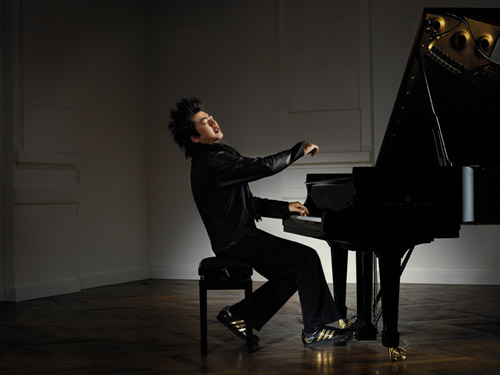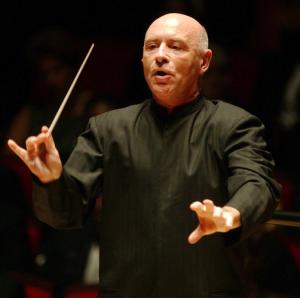Lang Lang serves up propulsive Prokofiev and mixed Mozart at the Harris Theater
At the ripe age of 27, Lang Lang has already vaulted through more career stages than most performing musicians achieve in a lifetime.
A decade ago, the teenage Chinese pianist made his debut with a spectacular Tchaikovsky performance with the Chicago Symphony Orchestra at the Ravinia Festival subbing for an ailing Andre Watts. He quickly became a multimedia star and a classical phenom, earning superlatives from critics and riotous ovations from audiences. Then the inevitable reaction set in, as the young virtuoso became the object of critical scorn for performances heavier on flash and speed than insight and interpretive depth.
Lang Lang appears to have pulled out of his sophomore slump, based on the performances of Mozart and Prokofiev concertos Sunday afternoon at the Harris Theater with Christoph Eschenbach and the Schleswig-Holstein Festival Orchestra. And while he appears to be tempering the razzle-dazzle with greater maturity and artistic seasoning, some of the pianist’s touches will still provoke debate.
Lang Lang is alternating Mozart and Prokofiev on this 22-city tour and Chicago got to hear both concertos Sunday at the Harris.
His take on Mozart’s Piano Concerto No. 17 gave equal ammunition for admirers as well as detractors. The opening Allegro showed the soloist a stylish Mozartian, Lang Lang bringing a playful delicacy to the music and subtle dynamic and tonal nuances that avoided anachronism, as with his improvisatory take on the cadenza.
The Andante was more variable, the pianist bringing a hushed tragedy to the music at times yet also spreading chords and drawing the music out in Romanticized fashion, playing with the music rather than performing it. Unsurprisingly, the closing Allegretto morphed into a Presto, one of Mozart’s most charming inspirations vulgarized into a breathless hypertensive pyrotechnical display totally alien to the score and its spirit.
As one might expect for a work composed by and premiered (in Chicago) by another young keyboard firebrand, Prokofiev’s Piano Concerto No. 3 suited Lang Lang much better. In fact, with its quirky nervous energy and explosive bursts of keyboard brilliance, Prokofiev’s Third Concerto could have been written for him.
Yet while there was flame-throwing bravura in abundance in the outer movements, it was striking how restrained much of his Prokofiev was, with the opening movement almost, well, Mozartean. Lang Lang’s playing was full of distinctive touches, the abrupt march-like second theme with its castanets, having a decidedly Eastern expression in the Chinese pianist’s hands.
As thrilling as the outer movements were, the central variations offered the finest playing of the afternoon. The soloist brought a specific concentrated expression and palette to each variation, from breakout virtuosity to introspective languor—not mouse-quiet but “deep-quiet” as Dame Myra Hess would say.
The spiky angularity of the finale suits Lang Lang like a glove and with Eschenbach and the orchestra providing equally full-tilt support, the coda’s fusillade of cluster-note arpeggios and keyboard runs were an astounding display even by this artist’s standard. Repeated ovations brought Lang Lang back out for a brightly colored encore of Chopin’s Etude in G flat, Op. 10, no. 3.
The Schleswig-Holstein ensemble is a training orchestra for young professional musicians with especially fine strings, mostly secure brass and variable woodwinds (flute and bassoon excellent, oboes and clarinets less consistent). Under Eschenbach’s intense direction, the orchestra showed their mettle in music of Beethoven and more Prokofiev.
The Leonore Overture No. 3 got off to a shaky start with timpani and orchestra not in synch, further unaided by Eschenbach’s fussy direction and extreme tempos, though the blazing coda made daunting impact.
Prokofiev’s Classical Symphony was a similarly mixed bag, the German conductor’s emphatic approach shorting the wit and charm with a perversely slow crawl for the opening movement. Taken at a breathless clip, the finale was undeniably exciting, the young musicians handling Eschenbach’s breakneck tempo with security.
Posted in Performances






